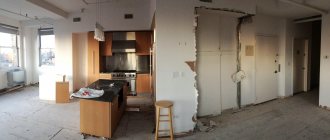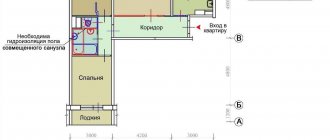You need to approve the redevelopment if you change the configuration of the apartment or its premises. This work may consist of demolishing or installing walls and partitions, erecting or dismantling mezzanines, sealing or expanding window and door openings, and other types of repairs. To coordinate or legitimize redevelopment, you always need a project that will be checked by specialists from municipal and state bodies.
Get an estimate of the cost of this service using our price calculator - here
Read in this material what reconstruction and redevelopment include, how such work is designed, and how to avoid fines for unauthorized changes in the apartment.
What is redevelopment and reconstruction?
The definition of reconstruction and redevelopment is specified in the Housing Code of the Russian Federation. There is also an approximate list of changes in the characteristics of the apartment, which must be indicated in the project, agreed upon or legalized through the authorized bodies. When designing and performing work in an apartment, it is necessary to ensure the safety of the building, its load-bearing and non-load-bearing structures.
In simple terms
Reconstruction and redevelopment are types of construction work, as a result of which the original characteristics of the living space change. During redevelopment, the configuration of the premises changes, including:
Dear Clients!
The information in this article contains general information, but each case is unique. You can get a free consultation from our engineers using one of our telephone numbers - call:
8 Moscow (our address)
8 St. Petersburg (our address)
All consultations are free.
- dismantling, erecting or moving partitions, walls, including the redistribution of space between rooms;
- cutting, widening or sealing openings for windows and doors;
- arrangement of a separate exit to the street;
- construction or dismantling of mezzanines, i.e. platforms above floor level;
- other types of work, if their results change the initial parameters of the apartment.
If the repair is cosmetic in nature and does not involve changes in parameters, it does not need to be approved. It is possible to determine whether the planned work falls under redevelopment by comparison with regulations.
Reconstruction consists of changing the characteristics of engineering and plumbing equipment, places for laying pipes and communications. Such work will not affect the size of the main and auxiliary premises of the apartment. However, simultaneous redevelopment and reconstruction are allowed, and these works can be specified and agreed upon in one project.
Legally
The official definition of reconstruction and redevelopment is specified in Art. 25 of the Housing Code of the Russian Federation. In addition to the general description of the work, the Housing Code of the Russian Federation provides for changes to the technical passport of an apartment building. Therefore, when submitting a project for approval, you must attach a technical passport from the BTI, and after completion of the redevelopment and reconstruction, appropriate changes will be made to the document.
In addition to the Housing Code of the Russian Federation, the following regulations will be applied for design and approvals in Moscow:
- Moscow Government Decree No. 508-PP ();
- Moscow Government Decree No. 432-PP ();
- Moscow Government Decree No. 692-PP ().
In particular, Resolution No. 508-PP specifies the exact list of works that fall under redevelopment and reconstruction in the apartment. Also, PP 508 lists prohibited types of work that can lead to deterioration of the characteristics of the premises and building.
Get an estimate of the cost of this service using our price calculator - here
Expert commentary. If you need to design and coordinate redevelopment work, please contact ]Smart Way[/anchor]. We specialize in developing projects for any types and series of houses, we will provide assistance at all stages of approvals or legalization, and we will choose the right work according to 508-PP.
When working on doorways during redevelopment, it may be necessary to strengthen the structures, as in this photo
Services for coordinating the redevelopment of non-residential premises in Moscow
The procedure for registering the redevelopment of non-residential facilities depends on their location: in the case of renovation of non-residential premises in an apartment building, all changes must be approved by the Moscow Housing Inspectorate. In addition, permitting documents may be required from Rospotrebnadzor, the Ministry of Emergency Situations, Moskomarkhitektura, Mosenergo, Moskomnaslediye, etc., depending on the scale of the planned work. At the same time, it is much more difficult and expensive to legitimize repairs that have already been completed, so it is recommended to coordinate all changes in advance.
If you need help in coordinating the redevelopment of non-residential premises, specialists are always ready to help you. We will not only develop and prepare all the necessary documentation, but also have it approved by the competent authorities in the shortest possible time. The cost of approving the redevelopment of non-residential premises in our organization ranges from 180 thousand rubles. You will find more detailed information about our services on the official website or by calling us at tel. 8 (495) 956 70 30.
Contact us, we know how to help you!
What not to do in an apartment
Resolution No. 508-PP also specifies prohibitions on certain types of work that may lead to damage to the strength or destruction of load-bearing structures of multi-unit apartment buildings, engineering systems and the appearance of facades. Approval for redevelopment or reconstruction will be refused in the following cases:
- disruption of the normal operation of ventilation ducts, their sealing or dismantling;
- restricting access to resource metering devices, devices for shutting off cold or hot water;
- any type of work that makes the apartment unsuitable for habitation (for example, combining a living room and a kitchen equipped with gas);
- expansion of auxiliary premises and corridors by reducing living space;
- work on load-bearing structures and walls exceeding the maximum permissible loads;
- installation of device equipment to limit the water supply to the general networks of apartment buildings;
- expansion of the area of bathrooms and toilets, if they are located above the residential or auxiliary premises of the lower apartment;
- installation of heated floors powered by communal hot water supply systems or central heating.
All of the above prohibitions will be taken into account by our designers if you order documents for redevelopment or reconstruction in ]Smart Way[/anchor].
Before demolishing all walls and partitions, you need to make sure that this is not prohibited
Supreme Court of the Russian Federation on illegal redevelopment
The Supreme Court overturned the appeal ruling of the regional court. The grounds for cancellation were significant violations of procedural law that influenced the outcome of the case (Article 387 of the Code of Civil Procedure of the Russian Federation).
It turned out that the regional court incorrectly decided that a change in the owner of the property, if the property was acquired by the new owner without an encumbrance, does not in itself entail the transfer to the new owner of this property of the obligations assigned by the court decision to the former owner.
The regional court violated the law - the law on enforcement proceedings. The Supreme Court indicated that there are still grounds to replace the defendant and oblige the new owner of the apartment to demolish the balcony.
Clause 1 Art. 53 N 229-FZ says that if one of the parties drops out, then the bailiff changes it to the legal successor. A participant in the proceedings may withdraw for various reasons (clause 1 of Article 44 of the Code of Civil Procedure of the Russian Federation):
- death,
- debt transfer,
- sale of shares in the company,
- reorganization,
- change of owner.
The legal successor can be replaced at any stage of the trial (Clause 1, Article 44 of the Code of Civil Procedure of the Russian Federation). Debt obligations are transferred to him by force of law (Article 392 of the Civil Code of the Russian Federation).
The Supreme Court of the Russian Federation explained that the defendant in the claim for the demolition of an unauthorized extension is the one who erected it (paragraph 2, paragraph 2, article 222 of the Civil Code of the Russian Federation). If the extension was created with the help of contractors, then the customer will be responsible for it.
If an illegal extension is owned by someone who has nothing to do with its construction, the defendant in a claim for the demolition of such a structure will be the person who would have become the owner if the construction had not been unauthorized.
If the defendant, who was ordered to demolish an illegal structure, did not build it, he can file a lawsuit for damages against the person who carried out the unauthorized extension (clause 24 of the resolution of the Plenum of the Armed Forces of the Russian Federation and the Plenum of the Supreme Arbitration Court of the Russian Federation dated April 29, 2010 N 10/22) .
The responsibility to restore the residential premises to their previous condition lies with the owner of this premises and passes to the new owner.
The Supreme Court of the Russian Federation on the establishment of an easement on a land plot
132532
Norms of the Housing Code and PP 508
The Housing Code of the Russian Federation and Resolution No. 508-PP describe the procedure for designing and approving redevelopment and reconstruction:
- the decision to carry out work must be made by all apartment owners;
- if the work is related to the impact on the load-bearing walls of the apartment building and common property, it is necessary to hold a meeting of all residents of the house and obtain a positive decision;
- you need to order the project before the actual work is carried out (it is more difficult to legitimize already completed redevelopment);
- for approval, you need to obtain a technical report on the condition of the load-bearing structures of the apartment;
- approval takes place through MosZhilInspektsiya, and individual sections of the project will be approved by SES, BTI;
- after completion of the work, you need to receive an acceptance certificate from the acceptance committee;
- To legally secure the completed redevelopment, you need to obtain a technical plan through a cadastral engineer and undergo cadastral registration with Rosreestr.
The Housing Code of the Russian Federation specifies only general rules and terms for approvals. Resolution No. 508-PP contains a list of documents that the owner needs to collect and describes all stages of approvals. The final stage of approvals will be obtaining an extract from the Unified State Register through Rosreestr.
What are the consequences of illegal housing redevelopment?
If the BTI finds out about the illegal redevelopment (and sooner or later it will), the commission will demand that the housing be returned to its original appearance within the time limits established by law.
The apartment will have to fully comply with the original technical documentation; the corresponding requirement is stated in Article 29 of the Housing Code of the Russian Federation. If you do not carry out the necessary work to eliminate illegal redevelopment within the time limits established by law, the BTI Housing Commission will file a claim in court.
During legal proceedings, the following measures may be taken:
- Fine for uncoordinated redevelopment. It must be paid by homeowners. If, as a result of redevelopment, the operational characteristics of the house have changed for the worse (this is determined by the commission), then the amount can be very significant. But in most cases, the amounts do not reach 10,000 rubles for individuals and 100,000 rubles for legal entities. The minimum fine is 2,500 rubles.
- Seizure of property. This form of punishment is not used very often, but since the housing commission works directly with bailiffs, such punishment can cause a lot of inconvenience. At the same time, the culprit of the illegal redevelopment also pays for the participation of the housing inspection in the court hearing and the conduct of the process. All these fines and costs in case of non-payment are fixed, as a result you may, for example, be prohibited from traveling abroad.
- Deprivation of rights to real estate. This measure of punishment is an extreme measure; courts resort to it in very rare cases. Deprivation of the right is possible only if it is proven in court that the redevelopment carried out has created a situation in which other owners are at risk of collapse. That is, they must prove in court that their life and health are now in danger precisely because of the redevelopment.
Do you need repairs?
We have already renovated more than 500 apartments, we will be happy to help you too
Find out the cost of repairs
The concept of common property and meetings of owners
If redevelopment work will be carried out on common property, it is necessary to hold a meeting of owners and obtain their permission for the project. The common property of an apartment building includes common areas of the house - entrances, staircases and flights, external load-bearing walls of the building, facade elements, local area, general utility networks.
A typical example of work that requires a meeting of owners is the arrangement of a separate exit to the street. This is necessary if the apartment is transferred to the category of non-residential premises. In addition to approval by the majority of the owners of the house, for these types of redevelopment it is necessary to obtain the consent of the residents of all adjacent apartments, including below and above.
Dear Clients!
The information in this article contains general information, but each case is unique. You can get a free consultation from our engineers using one of our telephone numbers - call:
8 Moscow (our address)
8 St. Petersburg (our address)
All consultations are free.
A typical example of redevelopment. in which the consent of the owners of the apartment building is required - arrangement of a separate exit to the street
The State Duma is considering the possibility of tightening fines for unauthorized redevelopment
According to the people's representatives, the boundaries of responsibility need to be expanded. They propose to impose a fine of 2 to 2.5 thousand rubles on all persons who have made unauthorized redevelopment in empty premises.
Some time ago, the Supreme Court issued an explanation allowing authorized authorities to seize real estate if it was established that illegal redevelopment had been carried out. At the same time, rules were presented allowing for the reclassification of residential space into non-residential space.
Domestic practice of redevelopment of non-residential areas
When implementing such activities, the initiator must strictly adhere to the adopted legislative norms. The main goal of redevelopment of non-residential space is the development and promotion of business, as well as the improvement of existing working conditions. Not only the owner of the property, but also the tenant of the space can carry out redevelopment work, having the appropriate power of attorney and official permission.
Before embarking on practical operations, it is extremely important to familiarize yourself with the concept of redevelopment, the features of their organization and current legislative norms.
They talk about redevelopment when construction and installation activities lead to a change in the total area of the facility entrusted to the initiator of the measures, a change in the location of individual premises and an update to the previous configuration. The redevelopment has the main goal: to improve the quality of the area for subsequent use for commercial purposes.
Legalization of redevelopment is necessary if operations will be carried out on:
- installation of new floors and various kinds of partitions, which inevitably lead to an increase in the load on the load-bearing walls of the entire building;
- changing the location of sanitary facilities (with their relocation, demolition, installation);
- installation or demolition of a loggia, balcony, as well as making adjustments to their previous configuration;
- reducing or increasing the size of window openings, as well as their number;
- installation of equipment associated with connection to existing communications;
- changes in the design of the floor base, inevitably associated with an increase in the load on the supports of the building;
- dismantling or installing new flights of stairs;
- input of communications.
These types of work are classified as redevelopment. And yet, before you start purchasing building materials, you need to check with experts. They will give a clear answer as to whether permission will be required to conduct the planned events.
Sometimes you can avoid the approval procedure and do all the work yourself, refraining from sending a notification to the local government office
You can avoid registration by taking steps to:
- cosmetic interior decoration that does not affect the load-bearing elements of the structure;
- replacing used communication units with similar ones (for example, replacing a sink with a new one of identical dimensions);
- dismantling built-in furniture items that are not shown in the technical documentation of the room.
The issuance of a permit indicating the possibility of redevelopment of the space is carried out by an organization member of the relevant SRO. The form becomes the basis for the subsequent generation of project documentation and its submission to the competent authorities for subsequent approval. Carrying out redevelopment without the specified form leads to the recognition of the activities as illegal and the imposition of adequate administrative measures on the initiator of the work.
How to legalize?
The Housing Code of the Russian Federation obliges to carry out measures aimed at legalizing redevelopment even at the stage of drawing up project documents and their approval. The legislation offers a standard algorithm of actions that must be performed by each copyright holder, including non-residential space. They are similar to those used for residential areas.
Legalization of already completed redevelopment is permissible only in court. The initiator of the procedure bears the burden of proving the absence of negative consequences of the completed redevelopment for the structure of the building, the health and life of people, the level of fire and sanitary safety of the facility. For this purpose, the project is sent to the representative offices of the Ministry of Emergency Situations and the SES.
The list of operations performed is largely determined by the room with what characteristics the redevelopment was carried out. It is much easier to go through all the coordination activities if the office is located in a separate building that is not intended for residential use.
Carrying out construction and installation operations should not provoke a violation of current sanitary, construction and fire safety standards. It is necessary to eliminate possible risks to human health and their lives.
Redevelopment is permissible:
- in a non-residential building designated for commercial purposes;
- in retail and office premises concentrated on the lower floors of residential buildings;
- in residential apartment buildings;
- separately located uninhabited buildings.
The owner of the property must go through the permitting procedure at the Interdepartmental Security Service of the prefecture of the relevant area. After the owner submits the documentation, the competent authorities visit the site to conduct the appropriate checks.
Still have questions? Fill out the application!
Approval of actual redevelopment and only planned redevelopment - differences
Above we described the standard process for approving redevelopment if it has not yet actually been completed. With this option, the owner does not face penalties, since he does not begin repairs in the apartment without obtaining approvals and permits. The situation is different with the legalization of actually completed work:
- uncoordinated redevelopment is the basis for the collection of fines, and if the characteristics of the apartment or building deteriorate, they may be required to restore the original condition;
- for legalization you also need to order a project, obtain a technical conclusion, submit documents to the Moscow Housing Inspectorate;
- if a refusal is received during administrative legalization, you can appeal it in court;
- a court decision confirming the safety of the redevelopment will be the basis for cadastral registration in Rosreestr.
If the work performed did not lead to a deterioration in the characteristics of the apartment and building, a positive decision is usually made by the Moscow Housing Inspectorate. If experts have identified a threat to the stability and strength of the MKD, additional work may be required to strengthen the structures. Without legalizing the redevelopment, you risk receiving a fine and recovery of costs for restoring damage to the apartment building.
Expert commentary. If you bought an apartment with unapproved redevelopment, the new owner will have to answer for fines. Therefore, you need to inspect the premises and carefully check the documents even before the transaction is completed - a BTI registration certificate with red lines, an extract from the Unified State Register of Real Estate. If the purchase has already taken place, immediately contact our specialists to legalize the redevelopment. If you start this procedure yourself, without instructions from the Moscow Housing Inspectorate, you can avoid collecting fines.
Fine for illegal redevelopment of an apartment
Redevelopment of the apartment must take place after obtaining permission. Complete redevelopment without permission, which is not prohibited, is subject to an examination and subsequent approval.
If there is no agreement, the guilty person, that is, the owner of the real estate, is held administratively liable and pays a fine for unauthorized redevelopment.
Let's consider what is unacceptable to do in redevelopment, in accordance with the norms established at the legislative level.
Redevelopment is prohibited if:
- This entails the inability to use the premises for its intended purpose.
- Affects the strength of the structures of a building or home, and can damage them.
- After carrying out repair work, the ventilation system of the premises, a residential building, failed.
- Contradicts sanitary and hygienic standards.
- Violates fire safety rules.
If illegal actions are committed, the homeowner will pay a fine for illegal redevelopment of the apartment and eliminate all violations in accordance with the technical plan. For example, for unauthorized installation of electrical networks, the violator will pay a fine of 3,900 rubles.
Supervisory authorities - MZhI, SES, BTI, Rosreestr
The approval process in Moscow involves contacting the following authorities:
- MosZhilInspektsiya (MZHI) – approves design documentation, issues an acceptance committee certificate;
- The SES issues a conclusion on compliance with sanitary, hygienic and epidemiological standards;
- BTI issues a technical passport of the building for project approvals, makes changes to the passport after completion of the redevelopment;
- Rosreestr carries out cadastral registration and enters updated data into the Unified State Register of Real Estate, which confirms the legality of the work performed.
The owner of the apartment can apply for approval to the specified departments himself, or through a representative by proxy. In the second option, interests can be represented by lawyers, specialists from the design organization, and other persons.
Get an estimate of the cost of this service using our price calculator - here
Features of coordinating openings in load-bearing walls and coordinating facades
Load-bearing walls and facades are classified as common property. Therefore, to coordinate openings or carry out façade work, additional approvals may be required:
- changes to facades must be approved by MosKomArchitecture;
- any work on common property must be approved by the owners of the apartment building, i.e. you need to receive the minutes of the meeting with a positive decision.
Facade work includes the arrangement of a separate exit to the street or local area, the construction of stairs to the premises of the second floor, cutting new openings or sealing them. To hold a general meeting, you need to present a project describing all upcoming work. Please note that a negative decision of the MKD meeting cannot be appealed, so you will have to negotiate with the owners.
Terms and costs of all work
The exact timing and cost of designing a redevelopment or reconstruction can be obtained after analyzing the features of the MKD apartment and the terms of the technical specifications. You can agree on prices and design terms during a consultation with our specialists. We offer our clients reasonable prices and short design deadlines, and we guarantee the quality of work.
Approval procedures are carried out on time. specified in the Housing Code of the Russian Federation and Resolution No. 508-PP. For example, approval for a project lasts no more than 45 days, and there is no need to pay fees at this stage. Cadastral registration with Rosreestr is also carried out free of charge. And its period can be 7 or 9 days.
3. Responsibility for unauthorized reconstruction and unauthorized redevelopment of residential premisesThe consequences of unauthorized reconstruction and (or) unauthorized redevelopment of residential premises are provided for in Art. 29 Housing Code of the Russian Federation. Unauthorized reconstruction and (or) redevelopment of residential premises carried out in the absence of a basis provided for by housing legislation (Part 6 of Article 26 of the Housing Code of the Russian Federation), i.e. document on approval of these actions, issued by the authorized body, or in violation of the reconstruction and (or) redevelopment project, submitted in accordance with clause 3, part 2 of art. 26 Housing Code of the Russian Federation. A person who unauthorizedly rearranges and (or) replans a residential premises bears the responsibility provided for by law. The legislation provides for a number of unfavorable legal consequences for persons who have unauthorizedly carried out reconstruction and (or) redevelopment of residential premises. So, in Art. 7.21 of the Code of Administrative Offenses of the Russian Federation establishes liability for violation of the rules for the use of residential premises, which can be expressed, in particular, in the unauthorized re-equipment of residential buildings and (or) residential premises (Part 1 of Article 7.21) or in the unauthorized redevelopment of residential premises in apartment buildings (Part. 2 Article 7.21). Actions for unauthorized re-equipment and redevelopment of residential and non-residential premises can be qualified by law enforcement authorities not only under this article, but also under Art. 19.1 Code of Administrative Offenses of the Russian Federation as arbitrariness. In addition, in Art. 7.22 of the Code of Administrative Offenses of the Russian Federation provides for liability for the refurbishment of residential buildings and (or) residential premises without the consent of the tenant (owner), if the refurbishment significantly changes the conditions of use of the residential building and (or) residential premises. In addition to administrative liability for unauthorized reconstruction and (or) redevelopment of residential premises, civil measures may be applied to persons guilty of these violations - the owner of the residential premises, which was unauthorized reorganization and (or) redevelopment, or the tenant of such residential premises under a social tenancy agreement, he is obliged to bring such residential premises to their previous condition within a reasonable time and in the manner established by the body carrying out the approval (Part 3 of Article 29 of the Housing Code of the Russian Federation). Consequently, the subject of the above liability can be not only the owner of the premises, but also the tenant under a social tenancy agreement. Based on a court decision, residential premises can be preserved in a rebuilt and (or) redesigned state, if this does not violate the rights and legitimate interests of citizens or does not create a threat to their life or health (Part 4 of Article 29 of the Housing Code of the Russian Federation). If the relevant residential premises are not restored to their previous condition within the specified period in the manner established by the body carrying out the approval, the court at the request of this body, provided that the decision provided for in Part 4 of Art. 29 of the Housing Code of the Russian Federation, makes a decision: 1) in relation to the owner - on the sale at public auction of such residential premises with the payment to the owner of the proceeds from the sale of such residential premises minus the costs of executing a court decision with the imposition on the new owner of such residential premises of the obligation to bring it to the previous state; 2) in relation to the tenant of such residential premises under a social tenancy agreement - on the termination of this agreement with the imposition on the owner of such residential premises, who was the lessor under the specified agreement, of the obligation to bring such residential premises to its previous condition. The body carrying out the approval, for the new owner of a residential premises that has not been brought to its previous condition, or for the owner of such residential premises who was the lessor under a terminated lease agreement, sets a new deadline for bringing such residential premises to its previous condition. If such residential premises are not restored to their previous condition within the specified period and in the manner previously established by the body carrying out the approval, such residential premises are subject to sale at public auction.
Cases of apartment redevelopment
]Smart Way[/anchor] specialists almost daily accept and hand over design work for redevelopment or reconstruction. You can see examples of recent work below.
Case 1. Redevelopment of a two-room apartment in Khrushchev. The project was developed and agreed upon in 2021, and was successfully implemented in the winter of 2021.
Case 2. Redevelopment and reconstruction of a three-room apartment in a new building. Since there were practically no load-bearing walls in the apartment, the designer was unlimited in the choice of solutions. The project was successfully approved in the summer of 2019 and implemented in October.
conclusions
Redevelopment approval is required if the configuration of the apartment or its premises changes. Construction work may involve the demolition or installation of walls, the construction or dismantling of mezzanines, the sealing or expansion of window and door openings, and other types of repairs. The reconstruction involves work on utilities and plumbing equipment in the apartment. To coordinate or legitimize redevelopment and reconstruction, you always need a project that is approved by the Moscow Housing Inspectorate and other departments.
Get an estimate of the cost of this service using our price calculator - here
In ]Smart Way[/anchor] you can order a redevelopment and reconstruction project for any series of houses and type of apartments. You can learn more about the terms of cooperation during a free telephone consultation.









